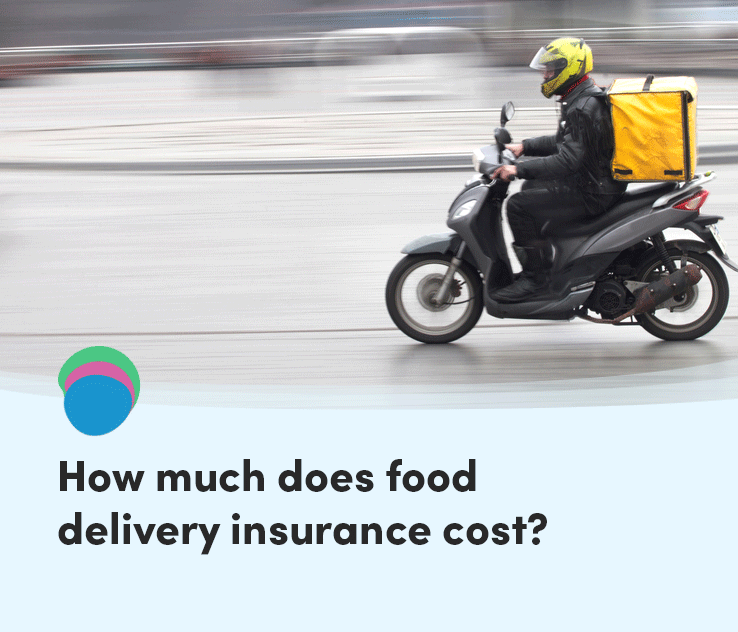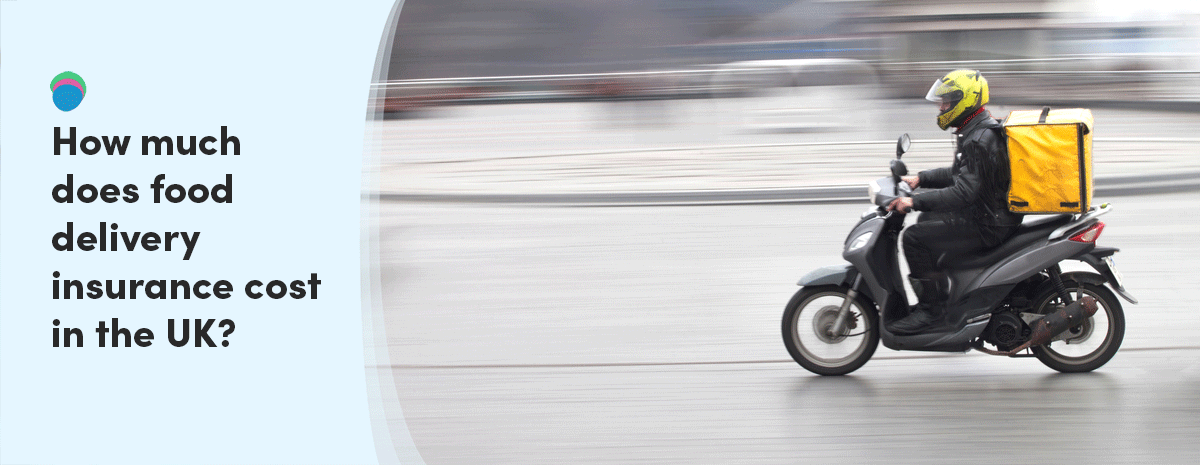How much does food delivery insurance cost in the UK?
The Food Delivery Industry is one of the fast-growing enterprises in the world and so, unsurprisingly, many of us are turning to a career in the food delivery sector in order to cash in on this lucrative market.
However, before the pizza hits the box and you hit the road, it’s critical that you have the right insurance cover in place. But what type of food courier insurance is necessary and what influences its cost?

To answer these questions and more, the Utility Saving Expert team has produced the following comprehensive article.
Article Contents
What factors impact the costs of food delivery insurance?
There are a variety of factors that can affect the cost of your insurance policies:
Personal driving record and history
Naturally, if you intend to be a food delivery driver, your driving history is going to affect your food courier insurance costs. As with standard motor insurance, the more blemishes on your record, the higher the cost of securing insurance policies.
Driver age & experience
Similar to standard car insurance, food delivery insurance fees tend to increase the younger you are and the newer to driving you are. This is because, statistically, younger/newer drivers are more likely to be involved in accidents.
As such, the older and more experienced you are, the less expensive your food delivery insurance is likely to be. This, however, does depend on your aforementioned driving record.
Where you live
Your location or the area within which you intend to operate as a delivery driver will also impact the price of your car insurance policy. This is because insurance companies consider factors such as the number of cars on the road (both parked and active) in your area and the type of roads you’ll frequent.
The greater the amount of traffic, the higher the risk of an accident and thus, the greater the cost of your insurance.
Time pressure
As a delivery driver, one of your main constraints is time. As such, many delivery drivers find themselves racing against the clock to meet their food deadlines and this “time pressure” can result in risk-taking and, thus, accidents.
Your insurance company will consider this when calculating your policy’s cost.
Working hours
As a delivery driver, you’re likely to undertake long shifts that can last for many hours, often into the night. With that in mind, even the best drivers will experience lapses in concentration and a slowing of their reaction time.
Hence, the longer you work, the more likely accidents will happen, which can impact the cost of your fast food delivery insurance.
Annual Mileage
Your annual mileage also has a part to play with the cost of your insurance policy. More driven miles will yield greater opportunities for accidents, and the wear and tear on your vehicle will also increase.
Thus, the higher your annual mileage, the higher the cost of your fast food delivery insurance.
The amount of excess you are willing to pay
Excess is the sum of money you agree (with your insurance provider) to pay upfront in the event of an insurance claim.
For example, if you have agreed to pay an excess of £150, and are then involved in an accident that will cost £800 to rectify, you are compelled to contribute the agreed £150 excess, following which your insurance company would cover the remaining £650.
Your excess sum can be compulsory and/or voluntary and, in general terms, the greater the excess you agree to pay, the lower the cost of your insurance plan. Furthermore, if you are not responsible for the accident, your insurance company will often reclaim the excess fee, on your behalf, from the responsible party.
The type of vehicle you want to insure
As with standard motor insurance, the type of car/vehicle that you want to insure for your food delivery service will impact the cost of your insurance plan. More specifically, factors such as size, age, environmental impact, condition, and more will influence the cost accordingly.
How much do the different types of food delivery insurance cost?
There are different costs for different types of insurance:
Hire and reward insurance
Hire and reward cover is a legally required policy designed for those using their own vehicle(s) to transport people or goods, for commercial purposes. With that in mind, hire and reward can be used to cover a multitude of vehicles, including vans, cars, HGVs, taxis, motorbikes, and even e-scooters.
Due to this inherent variability and the subjective circumstance of each and every claimant, hire and reward costs vary depending on age, experience, and the nature of your intended service.
For example, if you use your vehicle as a wedding car on weekends and as a courier car during the week, the overall cost of your insurance will be adjusted accordingly.
Pay-as-you-go
Pay-as-you-go insurance is a modern take on fast food delivery insurance and allows delivery drivers and bicycle couriers to secure cover on a monthly, weekly, daily or even hourly basis.
As a result, the user can secure coverage specifically for their working hours, with their policy reverting back to their standard social, domestic and pleasure insurance thereafter. Needless to say, then, pay-as-you-go policies can provide a substantial saving for couriers who work part-time hours (or less).
However, as above, the price of each policy varies depending on the individual.
Public liability insurance
Public liability insurance provides cover to you and your courier business against third-party claims of compensation and the potential legal fees incurred as a result. In particular, it covers claims made as a result of injury, damage to property, and even death on and off your premises.
As a delivery driver, the most likely cause of such claims is accidental damage caused to parked cars. Again, the price of your public liability insurance is subjective to your specific circumstances.
Breakdown cover
As the name suggests, breakdown cover is an insurance plan that will cover you in the event of a vehicle breakdown. Common causes are a punctured tire, flat battery etc. but can extend up to more substantial issues.
Many insurers incorporate breakdown cover into their standard motor insurance policies. However, if your current car insurance plan doesn’t include a breakdown cover, you must secure it separately. Again, the cost of breakdown cover varies depending on the factors discussed earlier in the article.
Product liability insurance
Product liability insurance is designed to provide cover for your business against third-party claims incurred as a result of faulty goods. As a delivery driver or courier, you simply transport the product and thus are unlikely to incur any product liability.
However, if the food/product you transport is faulty or causes damage or injury to a third party, then product liability insurance is a good safety net to have in place.
As with all insurance policies, the cost of product liability depends on your personal circumstances and the nature of your courier business.
Third-party courier insurance
Third-party courier insurance is the minimum level of insurance required for delivery drivers and couriers to operate legally as it covers both the vehicle and the transported food items in the event of third-party claims.
In particular, this type of insurance is highly recommended for bicycle couriers (in combination with public liability insurance) as it covers the food that they transport. However, in the event of an accident, third-party courier insurance doesn’t cover vehicle repairs.
Again, the cost of third-party courier insurance is subjective to your circumstances.
To find out more about which insurance plan is right for you, or to receive a quote, our Quote Comparison Tool will compare hundreds of policies, fast, in order to find the best deal for you.
How to reduce the costs of food delivery insurance in the UK
Luckily, there are several ways in which budding couriers and delivery drivers can reduce the cost of their fast food delivery insurance and they include:
Amount of excess
As noted earlier, the amount of excess that you agree to as part of your insurance policy can have a substantial impact on its cost. More specifically, agreeing to a higher voluntary excess sum can help to lower the overall cost of your insurance.
Insurance type
In short, additional cover dictates additional fees. As such, while you must establish a complete cover to match your needs, it’s worth considering whether certain “add-ons” are completely necessary. Likewise, if pay-as-you-go insurance is sufficient, then you could make a great saving.
Vehicle type, make and model
Just as car insurance varies depending on the make, model and type of vehicle you drive, food delivery insurance varies too.
Work hours/hazardous conditions
Clearly, working unsociable hours, such as through the night, or in locations predisposed to inclement weather patterns, will influence the cost of your insurance. Unfortunately, most food deliveries take place during night-time hours, however, if you can mitigate such circumstances, you may reduce your costs.
Low mileage
If you choose a lower mileage allowance, it demonstrates that you will spend less time driving which, in turn, yields less opportunity for accidents to take place. Lower risk equals lower insurance price.
Why does food delivery insurance cost more than a standard policy?
Fast food delivery insurance usually costs more than a standard insurance plan because it covers the additional pressures and responsibilities incurred by a food courier. These include but are not limited to:
- Time pressure
- The transportation of third-party goods
- Product liability
- Unsociable working hours
How to choose the right fast food delivery insurance policy for your business
As we’ve stated, choosing the right fast food delivery insurance for you and your business is a complex and subjective matter. At the Utility Saving Expert, we highly recommend consulting with our team of experts in order to establish precisely what type of insurance policy you need and where you can find the best package for your business.
To conclude, for budding food delivery drivers, the cost of insurance is as variable as the different types of insurance available. It’s therefore important to ensure that you are both legally covered for your work and that you have secured the most financially viable insurance cover available to you.
The most effective way of ensuring that you secure insurance that achieves this is to utilise the expertise of the Utility Saving Expert team. Thus, if you need delivery driver insurance for your fast food delivery service, please don’t hesitate to get in touch.
Frequently Asked Questions (FAQs)
Is food delivery insurance a legal requirement in the UK?
Yes, food delivery insurance is a legal requirement in the UK.
In particular, budding delivery drivers and couriers must have at least a hire and reward and/or third-party insurance policy in place before starting their new career delivering food.
Can I use car business insurance to deliver food within the UK?
Food delivery insurance is a sub-category of standard car business insurance. As a result, standard car business insurance isn’t sufficient to legally deliver food within the UK. Rather, you must have also secured the correct specialist fast food cover.
How can I determine if my business needs fast food delivery insurance?
Essentially, if your business involves delivering perishable goods, you must have food delivery insurance in place. Crucially, however, if you are a restaurant owner who utilises the services of a third-party courier business to deliver your food, you will not require food delivery insurance.
What are the consequences of driving illegally without the right food delivery insurance coverage?
The consequences of driving illegally without the right fast food delivery insurance in place are both judicial and financial.
First, without the correct coverage, you will be personally responsible for the legal and financial fees incurred as a result of your illegal activity. Judicially, if you are found to be working illegally, you will gain a criminal conviction and, at the very least, several points on your driving license.

Chris Richards
Chris is a personal finance specialist who founded Council Tax Advisors in 2012, assisting over 250,000 people with their Council Tax debt. Observing that many clients overpaid on utilities, he launched Utility Saving Expert in 2014, an energy price comparison site. In 2016, the platform expanded its services to include consumer and business insurance comparisons. Utility Saving Expert stands out with its commitment to social responsibility, donating 10% of net profits to fuel poverty charities, underscoring its dedication to both client value and community support.
